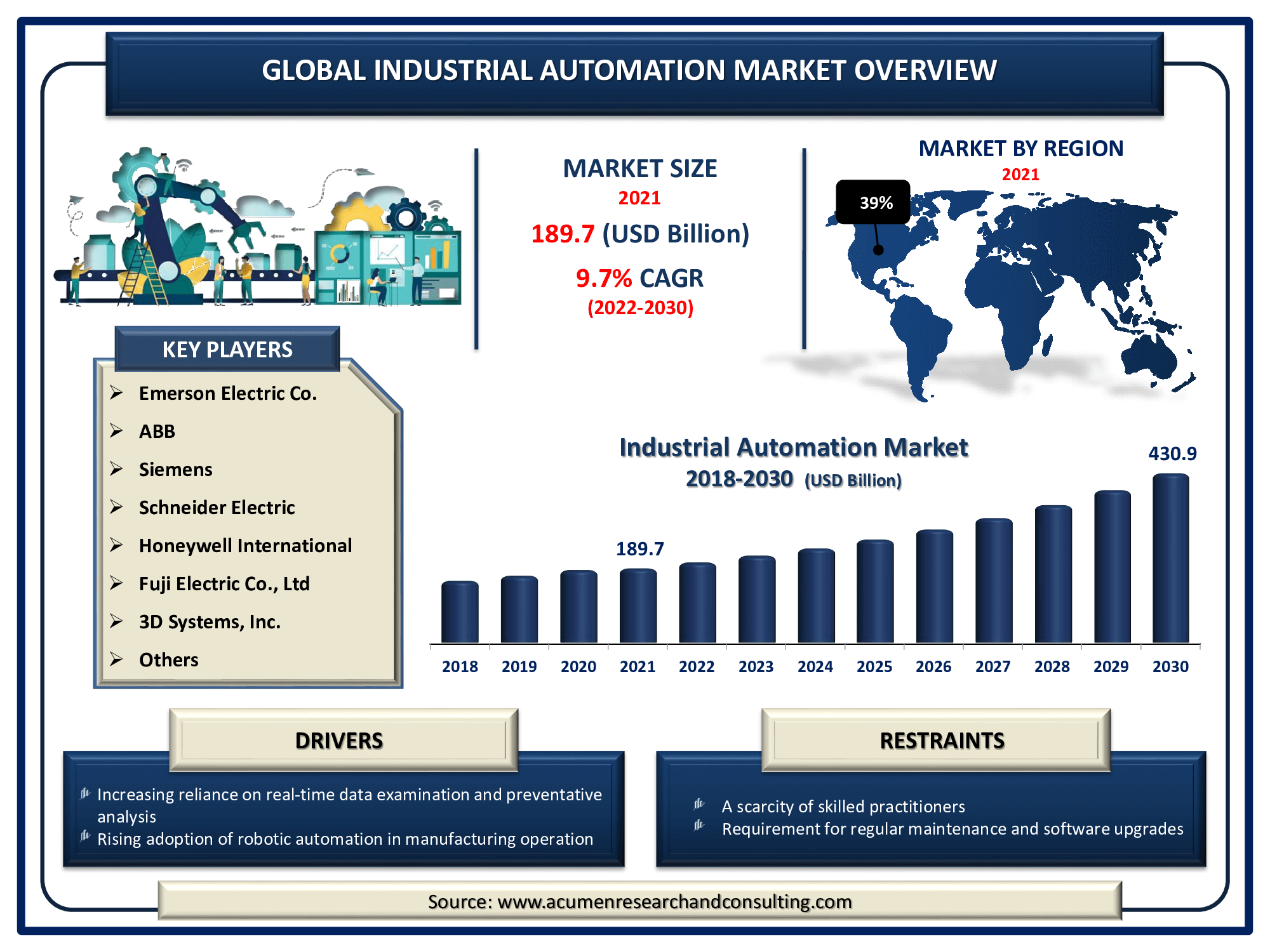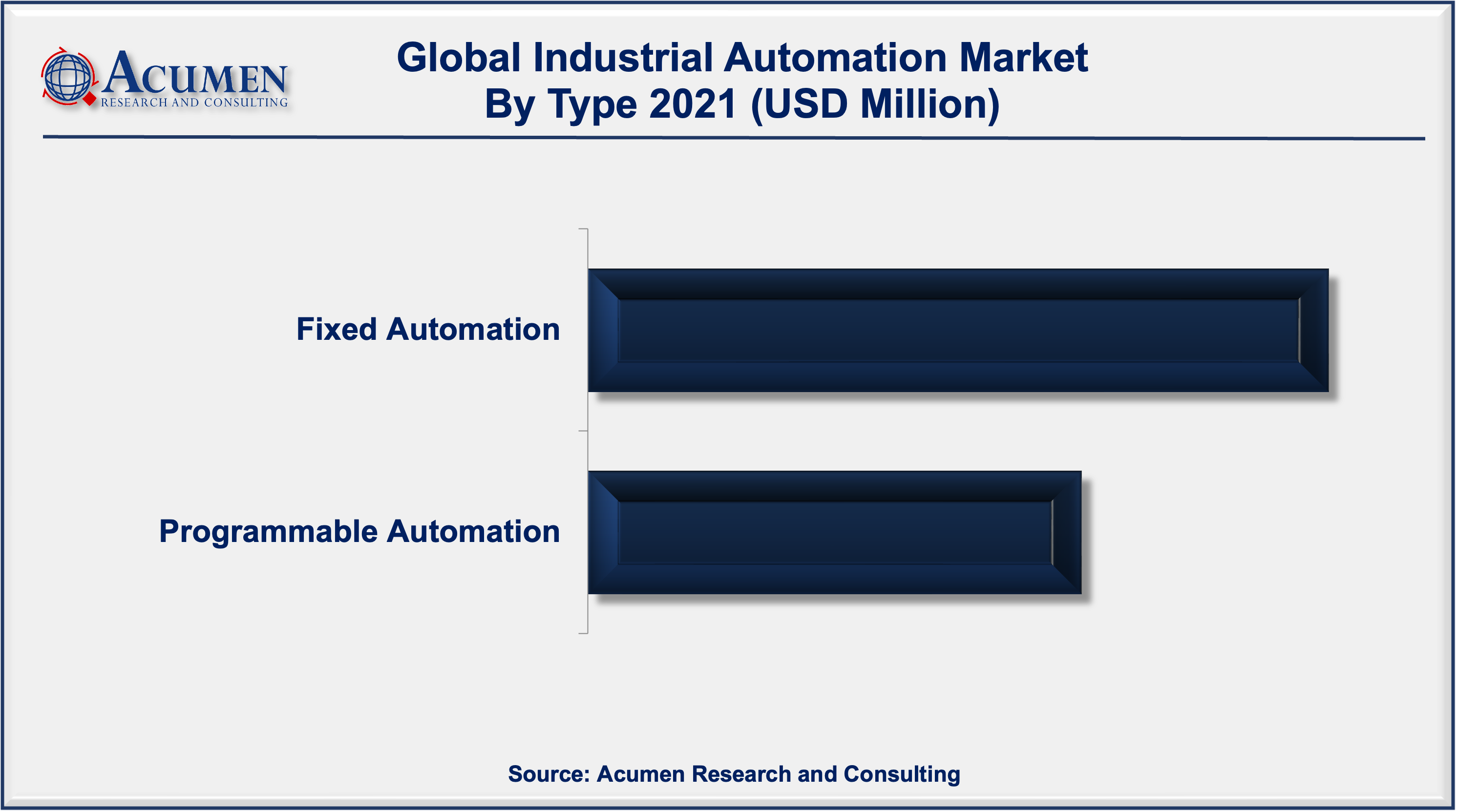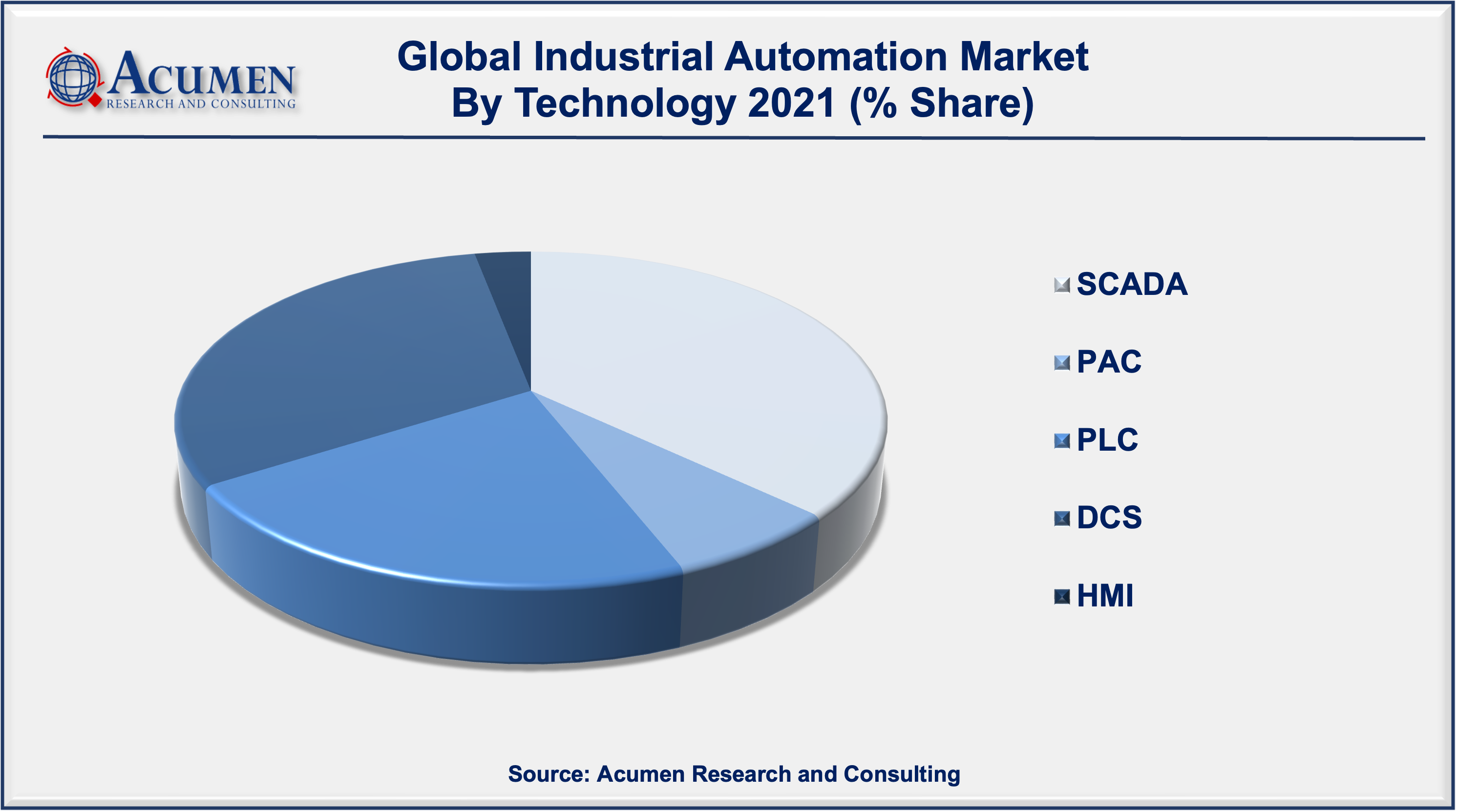Industrial Automation Market Analysis - Global Industry Size, Share, Trends and Forecast 2022 - 2030
Published :
Report ID:
Pages :
Format :
Industrial Automation Market Analysis - Global Industry Size, Share, Trends and Forecast 2022 - 2030
Report Coverage
- Industry Dynamics
- Market Size and Forecast Data
- Segment Analysis
- Competitive Landscape
- Regional Analysis with a Niche Focus on Country-Level Data
- High Level Analysis - Porter's, PESTEL, Value Chain, etc.
- Company Profiles of Key Players
- Option to Customize the Report As Per Your Specific Need
Request Sample Report
The global industrial automation market size accounted for USD 189.7 Billion in 2021 and is predicted to be worth USD 430.9 Billion by 2030, with a CAGR of 9.7% during the projected period from 2022 to 2030.
 The global industrial automation market is set for a paradigm shift as end-user industries step up their investments to focus on increasing plant capacity with modular equipment and digital technologies. With a focus on digital transformation, there is an equal emphasis on improving reliability and efficiency of assets on site. Companies are investing in the industrial internet of things technologies, remote condition monitoring, and diagnostics to address unmet maintenance needs and emphasize predictive maintenance. Data has become the most strategic asset: success depends on how data is utilized. Automation majors have realigned their market strategies to capture opportunities offered by digitization.
The global industrial automation market is set for a paradigm shift as end-user industries step up their investments to focus on increasing plant capacity with modular equipment and digital technologies. With a focus on digital transformation, there is an equal emphasis on improving reliability and efficiency of assets on site. Companies are investing in the industrial internet of things technologies, remote condition monitoring, and diagnostics to address unmet maintenance needs and emphasize predictive maintenance. Data has become the most strategic asset: success depends on how data is utilized. Automation majors have realigned their market strategies to capture opportunities offered by digitization.
Global Industrial Automation Market Dynamics
Industrial Automation Market Drivers
- Increasing reliance on real-time data examination and preventative analysis
- Rising adoption of robotic process automation in manufacturing operation
- Governments are launching strategic campaigns to strengthen the use of industry 4.0.
- The introduction of connected enterprises fuels the demand for industrial automation
- Concentrates on industrial automation for efficient utilization of resources
Industrial Automation Market Restraints
- High capital expenditures for industrial automation solution installation and maintenance
- A scarcity of skilled practitioners
- Requirement for regular maintenance and software upgrades
Industrial Automation Market Opportunities
- Steadily increasing need for safety compliance automation solutions
- Utilization of emerging technologies such as IIoT and cloud computing in industrial settings
- Advancement of machine learning and big data analytics
Industrial Automation Market Report Coverage
| Market | Industrial Automation Market |
| Industrial Automation Market Size 2021 | USD 189.7 Billion |
| Industrial Automation Market Forecast 2030 | USD 430.9 Billion |
| Industrial Automation Market CAGR | 9.7% During 2022 - 2030 |
| Analysis Period | 2018 - 2030 |
| Base Year | 2021 |
| Forecast Data | 2022 - 2030 |
| Segments Covered | By Type, By Technology, By End-User, And By Region |
| Regional Scope | North America, Europe, Asia Pacific, Latin America, and Middle East & Africa |
| Key Companies Profiled | Emerson Electric Co., ABB, Siemens, Schneider Electric, Endress Hauser Management AG, Yokogawa India Ltd., Honeywell International Inc., Azbil Corporation, Fuji Electric Co., Ltd, 3D Systems, Inc., HP Development Company, FANUC CORPORATION, Stratasys Ltd., Hitachi, Ltd., and Rockwell Automation, Inc. |
| Report Coverage |
Market Trends, Drivers, Restraints, Competitive Analysis, Player Profiling, Regulation Analysis |
The application of advanced automation control systems is one of the critical reasons that will drive the industrial automation market in chemical and petrochemical industry. There is an increase in the need for fast and accurate systems in the process and discrete industries. This is resulting in the emergence of technologically advanced automation control systems. These systems have features such as faster processors and increased memory capacity. They are extensively used to perform complex production processes carried out in the chemical and petrochemical industry. Also, issues such as space limitation and process complexity with conventional PLCs can be overcome with the help of customized PLCs for small, medium, and large machines used in this industry.
Industrial Automation Market Segmentation
The global industrial automation market segmentation is based on the type, technology, end user, and geographical region.
Industrial Automation Market By Type
- Fixed Automation
- Programmable Automation
 In terms of type, the market has been split into fixed automation and programmable automation. According to the industrial automation industry analysis, the fixed automation segment is expected to increase at a significant rate in the market over the next few years. Fixed automation, also referred to as hard automation, relates to a computerized manufacturing facility in which the order of processing processes is determined by the machinery setup. Furthermore, implementing a fixed automation system, such as robotic conveyor systems, and incorporating value-added initiatives to minimize both time and labor costs in their installation, relieves competitive forces on the business, rises profit margins, and keeps users one step ahead of its competitors.
In terms of type, the market has been split into fixed automation and programmable automation. According to the industrial automation industry analysis, the fixed automation segment is expected to increase at a significant rate in the market over the next few years. Fixed automation, also referred to as hard automation, relates to a computerized manufacturing facility in which the order of processing processes is determined by the machinery setup. Furthermore, implementing a fixed automation system, such as robotic conveyor systems, and incorporating value-added initiatives to minimize both time and labor costs in their installation, relieves competitive forces on the business, rises profit margins, and keeps users one step ahead of its competitors.
Industrial Automation Market By Technology
- SCADA
- PAC
- PLC
- DCS
- HMI
 The DCS segment will account for the significant share of the industrial automation market in chemical and petrochemical industry due to the growing adoption of DCS in chemical and petrochemical plants. This is due to their ability to control and monitor process variables such as temperature, pressure, and flow rate through the production process.
The DCS segment will account for the significant share of the industrial automation market in chemical and petrochemical industry due to the growing adoption of DCS in chemical and petrochemical plants. This is due to their ability to control and monitor process variables such as temperature, pressure, and flow rate through the production process.
Industrial Automation Market By End User
- Machine Manufacturing
- Oil & Gas
- Aerospace & Defense
- Electronics
- Automotive
- Pharmaceuticals
- Others
In terms of end users, machine manufacturing segment is predicted to witness a gradual growth over the forecast amount. Automation empowers small American businesses to stand toe-to-toe with entrenched rivals around the globe. With greater technical know-how and stronger strategy, these firms can continue to produce quality goods at reasonable costs. End-to-end factory automation will double or even triple production compared to plants that use only a few automation systems. Not only that, but equipment can often be kept running for longer periods of time with comparatively very little impact on the maintenance outlook. This lets companies outperform even rivals with a lot of simpler or low-quality goods.
Industrial Automation Market Regional Outlook
North America
- U.S.
- Canada
Europe
- U.K.
- Germany
- France
- Spain
- Rest of Europe
Asia-Pacific
- China
- Japan
- India
- Australia
- South Korea
- Rest of Asia-Pacific
Latin America
- Brazil
- Mexico
- Rest of Latin America
Middle East & Africa
- GCC
- South Africa
- Rest of Middle East & Africa
In 2021, Asia- Pacific Dominated the Regional Market with a Maximum Market Share
Asia- Pacific accounted for the high market share of the global industrial automation market and the region is also expected to maintain its dominance over the forecast period. Some major factors contributing to this growth are due to the economic growth in nations such as India and Indonesia. The growing application areas on a yearly basis. Advancement in technologies along with integration with current manufacturing environment is predicted to stimulate the market growth. Moreover, the presence of manufacturing companies and developing economy of the Asian countries is likely to contribute to the growth of the market throughout the assessment period.
Industrial Automation Market Players
Some of the prominent global industrial automation market companies are Emerson Electric Co., ABB, Siemens, Schneider Electric, Endress Hauser Management AG, Yokogawa India Ltd., Honeywell International Inc., Azbil Corporation, Fuji Electric Co., Ltd, 3D Systems, Inc., HP Development Company, FANUC CORPORATION, Stratasys Ltd., Hitachi, Ltd., and Rockwell Automation, Inc.
Frequently Asked Questions
How much was the global industrial automation market size in 2021?
The global industrial automation market size in 2021 was accounted to be USD 189.7 Billion.
What will be the projected CAGR for global industrial automation market during forecast period of 2022 to 2030?
The projected CAGR of industrial automation during the analysis period of 2022 to 2030 is 9.7%.
Which are the prominent competitors operating in the market?
The prominent players of the global industrial automation market involve Emerson Electric Co., ABB, Siemens, Schneider Electric, Endress Hauser Management AG, Yokogawa India Ltd., Honeywell International Inc., Azbil Corporation, Fuji Electric Co., Ltd, 3D Systems, Inc., HP Development Company, FANUC CORPORATION, Stratasys Ltd., Hitachi, Ltd., and Rockwell Automation, Inc.
Which region held the dominating position in the global industrial automation market?
Asia-Pacific held the dominating share for industrial automation during the analysis period of 2022 to 2030.
Which region exhibited the fastest growing CAGR for the forecast period of 2022 to 2030?
North America region exhibited fastest growing CAGR for industrial automation during the analysis period of 2022 to 2030.
What are the current trends and dynamics in the global industrial automation market?
Increasing reliance on real-time data examination and preventative analysis and rising adoption of robotic process automation in manufacturing operation are the prominent factors that fuel the growth of global industrial automation market.
By segment end user, which sub-segment held the maximum share?
Based on end user, automotive segment hold the maximum share for industrial automation market in 2021.


